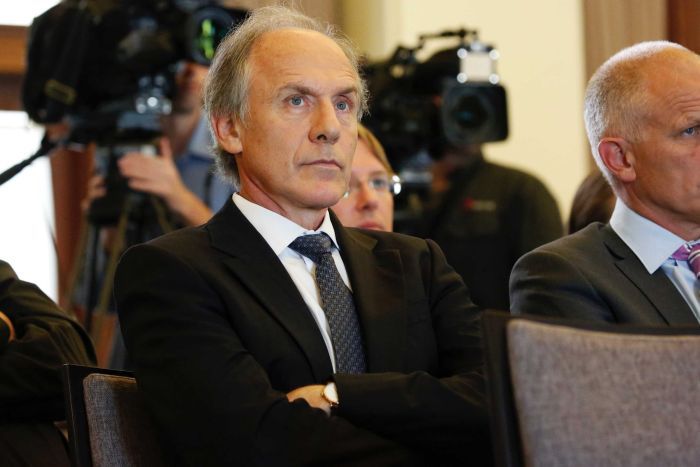Australia’s chief scientist Dr. Alan Finkel was in Adelaide yesterday to present the plenary address to the 2019 International Conference on Hydrogen Safety, a conference which also saw the unveiling of the South Australian (SA) government’s new Hydrogen Action Plan, a plan to make SA a major green hydrogen producer and exporter.
In an interview with RN Breakfast’s Hamish Macdonald, Finkel spoke about Australia’s evolving hydrogen economy and despite admitting that a majority of potential hydrogen will, “and probably should,” be produced solar and wind powered electrolysis, Finkel remained adamant that hydrogen produced via fossil fuels must still constitute a part of Australia’s hydrogen production provided the resultant carbon dioxide is captured through Carbon Capture and Storage (CCS).
CCS is not a popular option in Australia, but Finkel, as the Chair of the Hydrogen Strategy Group (HSG), seems less concerned with the sustainability of a hydrogen economy as with the establishment of the hydrogen economy regardless.
Of course, it must be admitted that Finkel is pushing a more nuanced argument. Finkel admits that hydrogen is a big piece in the transmission to a zero emissions economy, “but it is not by itself the solution,” says Finkel, “What I and others envisage is that in the dream future where all our energy comes from solar and wind as the primary energy source, around 15-20% of that energy will have to be delivered as a high-density transportable fuel and hydrogen is the ideal candidate.”
Finkel argues that the 15-20% margin represents the space in the economy in which the use of electricity directly is simply not convenient. Finkel provided the example of a ship carrying 100,000 tonnes of iron ore from Western Australia to China, “it is very difficult for me to imagine powering that ship by batteries, but it is very easy for me to imagine that ship being powered by clean hydrogen that will have the energy density to travel that distance with that cargo.”
Macdonald referenced a report from the UK government’s advisory Committee on Climate Change (CCC) in which the role of hydrogen, especially via electrolysis, was downplayed as a secondary or perhaps even temporary role. “Why are things different in Australia?” Macdonald asked.
Finkel reiterated that he does not think hydrogen is the “ant’s pants,” it is not a total solution, but at the 15-20% level “I see it as being part of the long-term solution.” Finkel disagrees with the findings of the CCC report, not just for the extrapolated case of Australia, but indeed for the UK as well. The key to the renewable energy transition, as we are to prioritise solar and wind, is to find ways to store the huge quantities of energy generated in summer, especially if we are to power big cities like Sydney and Melbourne. “At the moment,” argues Finkel, “one of the most prospective ways of storing massive amounts of energy, for long periods…is to convert that energy to hydrogen” whereby it can be stored as a liquid or a compressed gas. “So,” concluded Finkel, “I do not see that as a temporary solution…but a long-term, viable, permanent contributor to the transition to a zero emissions economy.”
Whilst Finkel admits that hydrogen produced via electrolysis produced with solar and wind technology will make up the majority of hydrogen production, he remains devoted to the idea that CCS needs to be considered an integral part of Australia’s future hydrogen economy.
Finkel admits that CCS has a bad reputation, and that people are rightly cynical about CCS for its low-efficiency and high cost. But, Finkel argues that there are projections which, in principle, though yet to be proven, show CCS for large-scale hydrogen production can be quite economical.
It is unclear why Finkel is so willing to push CCS on unproven evidence, and let us not forget, CCS is a method which has largely been discredited as a viable solution to fossil fuel emissions. Finkel argues that 100% renewable hydrogen would need competition (would it though?), and that the technology used to produce the hydrogen is not important so long as no greenhouse gases are emitted. This argument seems tepid at best, more convincing is the idea that Finkel’s extremely close ties to hydrogen mean that he doesn’t want to alienate the fossil fuel industry altogether.
This content is protected by copyright and may not be reused. If you want to cooperate with us and would like to reuse some of our content, please contact: editors@pv-magazine.com.









By submitting this form you agree to pv magazine using your data for the purposes of publishing your comment.
Your personal data will only be disclosed or otherwise transmitted to third parties for the purposes of spam filtering or if this is necessary for technical maintenance of the website. Any other transfer to third parties will not take place unless this is justified on the basis of applicable data protection regulations or if pv magazine is legally obliged to do so.
You may revoke this consent at any time with effect for the future, in which case your personal data will be deleted immediately. Otherwise, your data will be deleted if pv magazine has processed your request or the purpose of data storage is fulfilled.
Further information on data privacy can be found in our Data Protection Policy.